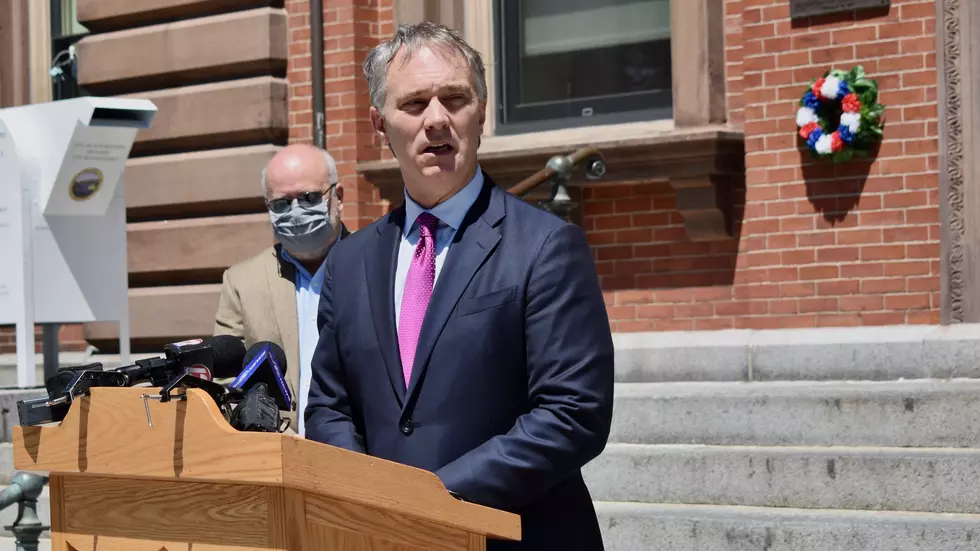![Pelosi, Schumer, and the Third Way to Extinction [OPINION]](https://townsquare.media/site/518/files/2019/01/duo.jpg?w=980&q=75)
Pelosi, Schumer, and the Third Way to Extinction [OPINION]
Beltway Democrats are so committed to moderation that they are about to triangulate themselves into oblivion.
Since the COVID-19 pandemic put a stranglehold on the American economy, the leftist policies that we were assured would lead us to a Venezuelan Socialist dystopia are finding the most unlikely allies in Washington: the Republican Party. Meanwhile, prominent Democrats' entrenchment in half-measured approaches is appealing to nobody but their lobbyists and themselves.
This centrist "Third Way" approach to governance has long been a losing formula for Democrats, and the recent leftward maneuvering by the GOP, albeit disingenuous, poses an existential threat to the Democrats as a major political party.
It began last Wednesday during an address to the American public from the Oval Office. President Trump proposed waiving all insurance copays and fees for testing and treatment related to COVID-19. This is seemingly an acknowledgment by Trump that the health insurance industry’s inhumane profiteering off of human sickness is a legitimate public health issue, as sick people who can’t afford treatment often don’t seek it. Of course, this never seemed to matter to Trump until it became a public health issue that could affect him directly. Still, he managed to beat House Speaker Nancy Pelosi (D-California) to the punch in his address.
Shortly thereafter, Speaker Pelosi and House Minority Leader Kevin McCarthy (R-California) plodded their way toward a tepid relief package so toothless that Pelosi would have been better served politically if she treated it like Trump’s SOTU transcript. The package offers free testing and treatment related to COVID-19 and 10 days paid leave for full-time workers, but with one major caveat: companies with 500 or more employees are exempt from requiring paid leave. This means not only the exemption of American’s largest companies and most frequent violators of labor rights – Amazon, McDonalds, Walmart, and the like – but it also leaves 80 percent of private-sector workers without the guaranteed sick leave that the relief package was supposed to provide.
Apologists of Pelosi say that the exemption was necessary for bipartisan support, but instead of making the GOP vote against a comprehensive relief package during a national crisis, they allowed the president and Senate Republicans to find room to the left of the Democratic leadership in Congress and exploit it.
When the bill moved from the House to the Senate, Sen. Tom Cotton (R-Alaska) said the relief package doesn't go far enough fast enough to put cash in the hands of affected families and workers. Senate Majority Leader Mitch McConnell (R-Kentucky) told Republicans to "hold your nose and vote for the bill." After the bill passed, he assured the public that there will be a more comprehensive bill to supplement the House package.
Meanwhile, another policy of the progressive left, Universal Basic Income (UBI), is being floated by members of both parties as a means of temporary cash relief during the crisis. UBI, generally, is guaranteed income afforded to people on a monthly basis by the government in the form of no-strings-attached cash. It has been recently popularized by entrepreneur and former Democratic presidential candidate, Andrew Yang, and is now being usurped by the president, Sen. Cotton, and Sen. Mitt Romney (R-Utah).
In fact, Romney’s proposal – a one-time payment of $1,000 per person – is even further left than notable Senate progressive Sherrod Brown’s (D-Ohio) initial proposal of one payment of $1000 per person but with means testing. Cotton takes it a step further than both Romney and Brown, proposing $1000 per person per month without means testing and until the crisis is over.
Around the same time, Sen. Kamala Harris (D-California) reintroduced her 2018 legislation, the LIFT ACT, that would give a tax rebate of $500 per qualifying household per month. Her painfully half-measured proposal was met with much maligning. Sure, once you cut through the red tape, this proposal has the potential to be more comprehensive than Cotton's proposal. However, Harris bungled the message so badly (as she’s prone to do) that she ended up coming off as an out-of-touch technocrat.
Where was Senate Minority Leader Chuck Schumer (D-New York), you ask? He was on Twitter proudly championing low interest loans for small businesses in need of relief. Conversely, Sen. Marco Rubio (R-Florida) was proposing cash relief for small businesses that they wouldn't have to pay back if it as used for payroll.
The only senator to the hard left of Romney and Cotton’s proposal is, of course, Senator Bernie Sanders (I-Vermont). Sanders’ cash relief proposal is a straight $2,000 per person per month for the duration of this crisis.
It’s also worth noting that younger more progressive members of the House, such as Joe Kennedy (D-Massachusetts), Tulsi Gabbard (D-Hawaii), Alexandria Ocasio-Cortez (D-New York), and Ilhan Omar (D-Minnesota) have all put forth comprehensive UBI proposals that are aligned with the Sanders' brand of economic populism. However, these much-needed relief efforts are being stymied by Pelosi and her obsession with byzantine measures such as targeted refundable tax credits.
Aside from UBI, Trump is also using the power of his office to freeze evictions and foreclosures, and invoking the Defense Production Act (DPA). The DPA allows his administration to force American manufacturers to engage in the large scale production of medical supplies. It’s worth noting that Trump’s policies also own a lion's share of the blame for the medical supplies shortage due to his tariff war with China, but that part of the message will be lost on most of the American public.
That’s what it’s all about, messaging. To be clear, even Trump and the GOP’s more comprehensive relief proposals are still half-measures in and of themselves. There is no reason to believe that the right’s sudden embrace of much-needed economic populism is anything more than temporary. The GOP is essentially dangling fundamental human rights in the face of the American public solely for the sake of their electoral hopes in November.
However, the Democratic leadership’s insatiable desire to appease conservative economic interests is being used against them by the very people they often try to appease. It may lead to a political monopolization by GOP, or to the rise of an alternative progressive party to fill the vacuum left by Democratic corporatism.
For the sake of the country, I'm hoping for the latter.
Marcus Ferro is an attorney practicing in New Bedford and a weekly contributor to The Chris McCarthy Show on 1420 WBSM. Contact him at marcusferrolaw@gmail.com. The opinions expressed in this commentary are solely those of the author.

More From WBSM-AM/AM 1420

![New Bedford Community Health Center CEO Gives COVID Update [TOWNSQUARE SUNDAY]](http://townsquare.media/site/518/files/2020/03/outbreak-coronavirus-world-1024x506px.jpg?w=980&q=75)
![How New Bedford Should Handle the Rise in COVID Cases [TOWNSQUARE SUNDAY]](http://townsquare.media/site/518/files/2020/06/GettyImages-1215276619.jpg?w=980&q=75)






